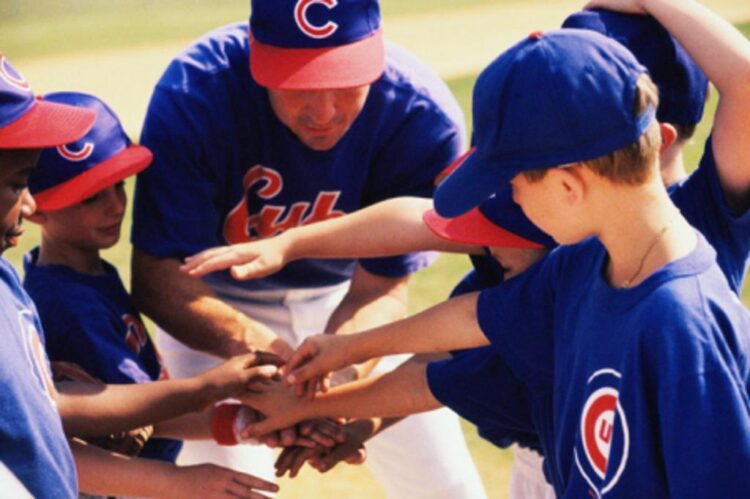What You Will Learn In This Article
- The benefits of T-Ball for preschoolers beyond just having fun
- Important life skills 4-year-olds develop on the T-Ball field
- How T-Ball teaches teamwork, confidence, listening, and focus
- Tips for parents on supporting your little leaguer
- Answers to common questions about T-Ball for young children
T-Ball is about as cute as youth sports get. A herd of tiny tikes in oversized uniforms, swinging plastic bats and running (often the wrong way) around a diamond that seems as big as a freeway. As adorable as it looks, T-Ball offers so much more than just smiles and snapshots for the family album. It’s an introduction to key life lessons.
For 4-year-olds, T-Ball sets the stage for developing competence, relationships, confidence, coordination, listening abilities, focusing skills, and dealing with winning and losing.
1. T-Ball Fosters Competence and Relationships
At just four years old, participating in an organized activity builds competence. It’s likely one of the first chances for kids to join a team and engage with other children without mom or dad hovering right beside them.
2. Confidence and Motor Skills Grow Through T-Ball
Running the bases. Catching little pop flies. Hitting a ball off a tee. To grownups, these seem like simple tasks. But preschoolers have a huge sense of pride and accomplishment as they practice and improve basic motor skills through T-Ball.
3. Listening Is Key Both On and Off the Field
Coaches, parents, and peers are all asking 4-year-olds to listen and follow directions while playing T-Ball. For little ones, this focus on listening is an important life skill that will serve them well when learning in school and engaging in extracurriculars.
4. Baseball Requires Concentration and Focus
A typical preschooler has a pretty short attention span, but participating in athletic activities helps stretch this mental muscle. Much like hitting takes hand-eye coordination, fielding a ball requires foot-eye-hand coordination along with focused attention.
5. Learning About Winning, Losing, and Teamwork
Unlike some children’s sports today, T-Ball isn’t structured around intense competition or championships. There’s no stress about trophies or titles for 4-year-olds. However, even at this age, kids experience what it feels like to succeed and fail individually and as a team.
6. Support Your Young Player with Proper Practices
If you have a preschooler in T-Ball for the first time, there’s a few things you as a parent can do to nurture their budding athletic interest.
7. Stay Engaged But Let Them Stretch Their Wings
It’s not easy to step back and give your babies some independence. But resisting the urge to be overinvolved sets important groundwork…
8. Kids Learn Best Through Their Own Experience
Some parents feel compelled to turn every moment into a teaching situation, offering constant commentary and advice as their young athlete participates. Instead, it’s important to give 4-year-olds space to learn through their own first-hand experiences…
Final Thoughts
Overly ambitious moms and dads sometimes lose sight of the ultimate goals for tots playing T-Ball. While skills development happens quickly at this age, preschool sports are first and foremost about fun – not championships or college scholarships down the road. As much as you hope your kid will love playing ball as they grow, the most vital life lessons from their introductory sport are off the field. Sure, they’ll get better at throwing, catching, hitting and all the rest.
But more importantly, T-Ball grounds them with critical social skills, focus abilities, coping mechanisms when they struggle, and confidence in their competence. These life skills, while not as tangible as their batting average or sprint speed, will pay dividends as your children grow into students, friends, teammates and eventually adults. So enjoy the ride as your little slugger gets their first taste of baseball, but realize that the magic happening is more than just sport itself.
Frequently Asked Questions
At what age can my child start T-Ball?
Most leagues allow children to start T-Ball as soon as they turn 4 years old. The priority at this age is helping kids build foundational skills and have fun rather than strict adherence to rules.
Is my preschooler too young for an organized sport like T-Ball?
As long as the environment nurtures play and exploration, T-Ball can be great even for younger 4-year-olds. The key is making sure expectations match their abilities.
My child gets distracted easily. Will T-Ball help improve their focus?
Yes! Having to pay attention to coaches, follow instructions, and remember role responsibilities really stretches their concentration.
Is T-Ball safe for preschoolers?
Absolutely. Safety standards require special equipment sized for smaller bodies. Always ensure coaches emphasize safe protocols too.
How can I tell if my kid is ready for T-Ball?
If they can follow multi-step directions, take turns patiently, and demonstrate basic motor skills, a positive T-Ball environment will help them continue progressing.



Pingback: How To Balance Youth Baseball With Other Sports - Baseball Boom